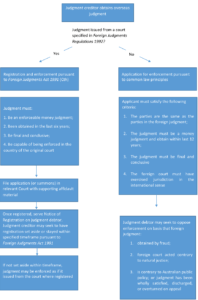Take home points
1. Whether or not the foreign judgment can be registered and enforced in Australia will depend on the type of judgment and country where the judgment was issued.
2. The Foreign Judgments Act 1991 (Cth) establishes a regime for parties to register and enforcement judgments made by certain foreign courts in civil proceedings. Judgments include both final and interlocutory orders made by a court in a civil proceeding.
3. If the judgment is not registrable under the Foreign Judgments Act 1991 there may be a treaty which allows for the enforcement to be enforced.
4. Alternatively, there are some exceptions where an order for payment of money from a foreign court may be enforceable in common law or equity in Australia. One of the biggest hurdles to address will be to establish that the foreign court exercised jurisdiction in the international sense over the judgment debtor.
Court proceedings can be a costly and complex activity. Even where a party is successful in court proceedings, there is no guarantee that the unsuccessful party will comply with the court orders and pay. The situation is further complicated where one of the parties is an international corporation primarily based overseas, but has assets in different countries.
As the world grows ever more interconnected, there has been increasing trend in international cooperation between various countries in relation to legal proceedings. In recognition of the fact that parties may have litigated abroad and wish to claim assets in Australia to satisfy those adjudicated claims, Australian law has developed a regime to allow for the enforcement of decisions of courts in foreign countries in Australia.
Recognition of a foreign judgments by Australian courts occurs when a state supreme court or the Federal Court accepts a judicial decision made by the courts of another “foreign” country or jurisdiction, and issues a judgment in substantially identical terms without rehearing the substance of the original lawsuit. In essence, the foreign judgment will be treated as if it was a decision issued by a domestic court as if it determined the dispute, provided a number of criteria are met.
There are three ways in which a foreign judgment may be treated as a judgment of a domestic Australian court so that a party can seek to rely on it (including having it enforced) in Australia. These are:
1. Registration of the foreign judgment under the Foreign Judgments Act 1991 (Cth) (the Act) provided the judgment is from a prescribed court from specified countries in the Act, and then seek to have the judgment enforced;
2. Enforced pursuant to a bilateral judgment which Australia has entered into; or
3. Enforced pursuant to common law or equitable principles to have the foreign judgment made a judgment of an Australian court.
Registration and enforcement pursuant to the Act
The Act creates an administrative regime which, subject to certain requirements being met, allows a judgment creditor to register a foreign judgment without having to commence fresh proceedings in Australia. The Act deals with the registration of money judgments that is judgments which require the payment of money including orders for damages and costs. Other non-money judgments (such as injunctions) may also be enforced in Australia but are must be done outside the scope of the Act.
The Act applies to money judgments that are obtained either on a final or interlocutory basis. To be registrable under the Act, the money judgment must satisfy the following criteria:
1. Be an enforceable money judgment;
2. Be given by a superior court or inferior court of a country specified in the Foreign Judgment regulations;
3. Have been obtained in the last six years;
4. Be final and conclusive – a judgment may treated as final and conclusive even though it may still be subject to appeal;
5. Not be wholly satisfied – a judgment which has been wholly satisfied cannot be registered under s6(6) of the Act though a partially satisfied judgment may be registered for the part that remains unpaid;
6. Be capable of being enforced in the country of the original court – it may be necessary to take steps in the country of origin such that the original judgment may be capable of being enforced before an application is filed in Australia; and
7. Not liable to be set aside under section 7 of the Act if registered – principally, show that the original court had jurisdiction to deal with the case to make the judgment which is being sought to be registered.
If the above criteria are satisfied, an application can be made to the relevant Court (either the Federal Court of Australia or Supreme Court of a State or Territory, depending the type of order being registered) on an ex-parte basis by preparing and filing affidavit evidence.
The application will be dealt with in Chambers by the Courts and once registered must be served with a Notice of Registration on the defendant. If the judgment debtor resides overseas, it may be necessary to serve them in accordance with the Hague Convention on the Service Abroad of Judicial and Extrajudicial Documents in Civil or Commercial Matters. The judgment debtor than has a set period of time specified in the order (usually 14 days) to apply to the Court to have it set aside if it can show that the criteria for registration under the Act were not met.
If no application is made to set aside the judgment within the prescribed time, then the judgment creditor may proceed immediately to enforce the judgment. If an appeal is commenced in relation to the judgment given by the original court, the Australian court may also order the enforcement of the judgment be stayed under section 8 of the Act pending final determination of the appeal. Recent examples of registration of foreign judgments under the Act in Queensland include Acteon Middle East Fze trading as Team Energy Dubai v Smith [2015] QSC 265, and Bank Polska Kasa Opieki Spolka Akcyjna v Richard Zbigniew Opara & Anor [2010] QSC 93.
The following flow chart sets out a summary of how a foreign judgment may be registered and enforced under the Act.
Flowchart – Enforcing overseas judgments under the Foreign Judgments Act 1991 (Cth)

Enforcement pursuant to a bilateral treaty, common law or equity
If a judgment cannot be registered under the Act for some reason (for example, the country is not listed in the Act as applicable – a notable absentee from the list is the United States of America), it may still be enforced if there is another instrument which provides for a mechanism for enforcement. For example, Australia is a party to the Reciprocal Recognition and Enforcement Judgments in Civil and Commercial Matters 1994 with the UK and the Trans-Tasman Proceedings Act 2010 with New Zealand.
Foreign judgment may be enforced also in accordance with common law principles upon making an application to the Court, provided that the following criteria are satisfied:
1. The parties are the same as the parties in the foreign judgment;
2. The judgment must be a money judgment (a fixed definite sum of money);
3. The judgment was obtained within the last twelve years;
4. The judgment must be final and conclusive – it must be determinative of the rights and obligations of the parties (and may include a default judgment). Again, the fact that the judgment may be subject to appeal does not affect its finality; and
5. The foreign court must have exercised jurisdiction in the international sense over the defendant and the defendant submitted to the foreign jurisdiction.
In determining whether or not the foreign court has jurisdiction, the Australian court will consider whether or not the judgment debtor was present in the foreign jurisdiction when they were served with the court documents commencing the action that lead to the judgment in the foreign proceedings, have submitted to the jurisdiction of the foreign court, or domiciled or ordinarily a resident in the foreign jurisdiction.
However, it has been noted by Australian courts that merely entering an appearance in a foreign court or participating in the proceedings to the extent necessary to contest jurisdiction, or protect/obtain a release of property seized in the proceedings does not necessarily amount to exercising international jurisdiction. See for example the Queensland Court of Appeal’s decision in de Santis v Russo [2001] QCA 457, and Wong v Jani-King Franchising, Inc [2014] QCA 076.
In some circumstances, a court may rely on equitable law to assist in the enforcement of equitable relief granted in a foreign court without that foreign judgment being made a judgment of the Australian court. For example, in the case of Independent Trustee Services Limited v Morris [2010] NSWSC 1218 the New South Wales Supreme Court granted orders for the appointment of a receiver to pursue the enforcement of rights determined by the foreign court and making of orders for an accounting to be conducted in relation to misappropriated trust assets and profits received by the judgment creditor.
Hurdles
A judgment debtor may seek to avoid or contest enforcement of a foreign judgment (either registered under the Act or through common law or another mechanism). Generally, a judgment creditor is entitled to seek to enforce a judgment if the above criteria have been met. While the judgment debtor is generally prohibited from raising any defence in relation to enforcement of a foreign judgment, it may argue that the foreign judgment was:
1. The foreign judgment was obtained by fraud;
2. The foreign court acted contrary to natural justice;
3. The foreign judgment is contrary to Australian public policy; or
4. The foreign judgment has been wholly satisfied, discharged, or overturned on appeal.
If the judgment debtor is able to successfully argue one of the above matters, it may be able to prevent enforcement if it is able to establish one of the above defences.
Final thoughts
With the increase in international trade and companies with assets in several countries, the law has developed a number of mechanisms to assist litigants seeking satisfaction of successful foreign court proceedings in Australia.
The Act and common law principles establish a framework by which successful litigants may seek to register and enforce foreign judgments in Australia. Registration pursuant to the Act is a cost-effective and relatively straight-forward process. Under the common law, litigants should carefully assess whether or not the foreign court has exercised jurisdiction in the international sense to determine if the foreign judgment may be enforced in relation to money judgments.
Businesses operating in multiple countries and engage in court litigation should recognise the risk that a foreign judgment may present to assets contained in Australia. To maximise the prospects and utility of enforcing a judgment, foreign lawyers may wish to consider obtaining advice at an early stage about the options to enforce judgments against Australian assets.
Enforcement is often an afterthought to litigation though considerable costs may be saved if consideration is given early on to devising an enforcement strategy. We are able to assist clients and foreign lawyers with having foreign judgments recognised and enforced against Australian assets.





